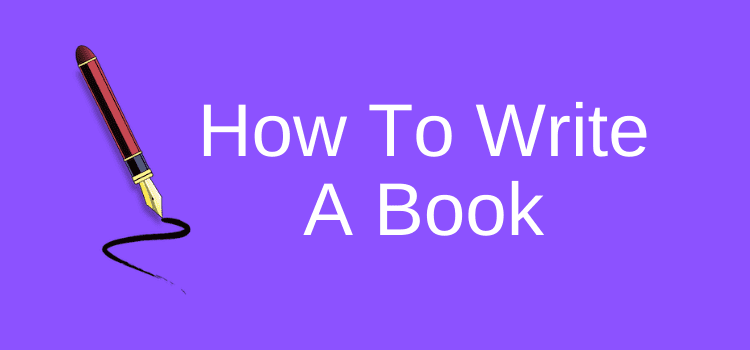
Do you want to know how to write your first book?
It’s an old saying that everyone has a book inside them.
But this truism is more valid today than ever before. Self-publishing has opened the door to anyone who has a story to tell.
New authors around the world are writing and getting new book ideas published every day.
You want to write a book
If you are ready to start writing a fiction or nonfiction book, you can do it.
But before you jump in, let me share some writing tips on how to do it if it’s your first time.
I’ve written a lot of books.
Some were relatively quick and easy to write, such as a few science fiction novels.
However, others that were historical fiction took me much longer due to the time I spent researching.
In all cases, though, I was passionate about the themes and enjoyed every minute of the process.
You’ll finish writing your book as long as you have a passion and are motivated and ready.
You’ll also enjoy every minute you spend researching and writing your book.
But be ready for the long haul.
Hopefully, the following tips on writing your first book will help you.
What is your motivation to write?
There are hundreds of reasons why you might want to get started writing a book.
Here are just a few.
You can probably think of more.
Create an escape – You want to write as a way to free yourself and readers from reality.
Create change – You want to write a book that will change or challenge people’s thinking.
To recover – Writing a book can be cathartic and help you overcome adversity.
To make money – There is no reason why you can’t write and sell books as a part-time activity.
Your authority – If you are an expert in a field, writing a book can enhance your credibility.
Posterity – You want to leave more than footprints in the sand.
Whatever your motivation, as long as it is strong, you are ready.
Writing the first few paragraphs of chapter one is easy.
But it will be your passion and the strength of your motivation that will help you keep moving forward when you are writing chapter twenty-two.
That’s when you need some stamina.
But you can get there.
How to start writing a book

Find your writing space
One of the first steps to writing a book is to find somewhere you can write without being disturbed.
It is impossible to write when noise and distractions surround you. You might have to make a deal with your family or change your routine.
Try to find somewhere quiet for your daily writing session. You might be lucky enough to have a study or a spare room. If not, it might be your balcony or a corner in a local coffee shop.
Another consideration is that the place where you write should be comfortable. You can’t write productively if you are sitting in an uncomfortable chair or crouching over a low table or desk.
For some writers, lazing on a sofa works. For others, a traditional office chair and desk are more appropriate.
Wherever you decide to write, make sure it provides the comfortable, quiet space and time you need to concentrate and lose yourself in your thoughts.

Your writing time
Well-known authors such as Stephen King and JK Rowling set themselves a daily writing target. In King’s case, it is 2,000 words every day.
You don’t need to be so strict. But you should schedule a time of the day that you can set aside to write your book. It might be in the morning or evening for one or two hours.
Depending on your family or work commitments, you may not be able to plan for seven days a week, especially if you work full-time. So choose the days you can fit in with your life.
You can also set a minimum word count for yourself. But don’t worry if you miss your target sometimes. It’s not a race. But setting yourself a writing goal is an excellent way to stay motivated.
How long will it take to write your book?
A fiction novel usually falls into the range of 60,000 to 80,000 words. It’s then an easy calculation.
If your daily target is 1,000 words, you can plan to have written your first draft in 60 to 80 days.

Your two writing tools
Writing a book is a long process. You will need to keep notes, track event timelines, and for a fiction writer, develop characters.
You can’t do any of these tasks with a standard word processor like Microsoft Word or Google Docs.
Working on a long document is also risky. One file or save failure can cause all your work to be lost.
When you write a book, you will be working on different chapters and scenes, and you want to be able to access these quickly. It is also much safer to have your manuscript divided into small files.
The only way to get the functionality and security you need when writing a long book is to use writing tools and software designed for the job.
1. Your writing program
Scrivener is the most popular book writing software for authors.
But you have a lot of other choices.
You don’t need to spend a lot of money. There are many free and open-source book writing programs available for you.
We have written a full article on free and three premium book writing software programs you can try.
2. Your writing assistant
The only other tool you will need is an online writing assistant. You might think of this as being a grammar and spelling checker.
But you need more than just a checker.
A good writing assistant program will help you with synonyms and sentence structure, reduce passive forms, highlight run-on sentences, and maintain your writing voice and register.
I would always recommend Prowritingaid as the first and best choice for new authors learning how to write.
It has over twenty different reports to help you with your writing. It is also highly suited to analyzing long documents, such as a manuscript for a fiction book.
As a second-best choice, Grammarly is a very popular grammar checker. It can do a lot to help you when you write. However, I find it more useful for online writing than for manuscripts.
You can check our list of grammar checkers to compare which one will suit you best.
There is a lot of software available for writers and publishers now. But for a book manuscript, you only need two.
Your book writing program and your writing assistant.

Outline your story
Once you have your writing space, time, and tools, it’s time to start writing.
However, good books and stories always develop from an outline or plan. Some writers go into great detail, while others work from a more basic overview.
I find that writing one or two paragraphs that encapsulate the story is a great help in clarifying your thinking. You need to include the beginning, middle, and, most importantly, the end of the story.
Another way is to make a list of what each chapter is about. You can then reduce these to draft chapter titles.
Knowing exactly how your story will end is the best way to avoid writer’s block. No matter how many plot twists you intend to use, you always know where you are heading.
It is the same for nonfiction. You need to cover a lot of topics, so put them in order before you begin. Make some notes on each subject point.
You might have heard that some authors say they let their characters lead the story and show them the way.
In my experience, this is a great way to write a lot and quickly. But it is so easy to get lost and wander off in all directions.
Then, it is extremely difficult to pull all the threads together for an ending.
I tried this process for one book, but I had to spend a lot of time fixing plot errors, changes in characters, incorrect timelines, and out-of-order events.
Of all the books I’ve written, that one was the most difficult to complete. When you have no plan, so many things can go wrong.
I would always advise a new author to outline the story in plenty of detail. It makes it so much easier.
You can then always refer back to your plan to know where you are and where you are going with your story.
There are many forms that a story or book outline can take. You need to choose one that you think will suit you.
It doesn’t matter which one you choose. But by preparing well before you start writing your story, you will stay on track all the way through the process of writing your book.

Writing your first draft
No one has ever written a book without a first draft. But there has never been a perfect first draft.
Don’t worry about your use of grammar, spelling, and formatting. It’s called the first draft for good reason.
You will have plenty of opportunities to hone, polish, and perfect your book in the editing process.
You will have a second, third, and maybe even fourth draft before you finish your book.
Your sole aim now is to get your story out of your head and into text. Stick to your writing schedule and perhaps your word count goal for each session.
When writing a book, I set myself a 1,000-word daily target. I can usually get there in around two to three hours.
It might take you a few sessions to get into the swing of it. But once you have started writing your first chapter, you will find your rhythm, and the words will begin to flow much more easily.
Don’t get ahead of yourself when you are writing your first draft. There is no point in thinking about your final book title, book cover, or how you will publish.
All of these matters can and should wait until you finish your story. Never mix writing and publishing.
It is also worth mentioning that you will write better when you are fresh and full of energy. So take care of yourself and make sure that you get plenty of sleep, have a healthy diet, and avoid unnecessary distractions.
In the perfect world, it would be great to disappear off to a remote tropical island for two months to write your manuscript. But alas, very few of us can afford to do it.

What to do when you hit a roadblock
There will be times when your words will flow and times when they seem to dry up. But you don’t want to stop writing your book.
Some call it writer’s block, but I am not a firm believer in it. Often, it is as simple as being tired, and you find it difficult to concentrate.
If this happens, take a break, go for a walk, or have a swim. You could even check out your social media messages.
Another remedy is to leave the chapter you are struggling with and start on a new one. You can even begin writing your last chapter.
One more danger when writing a book is writing it in your head.
It means that you have great ideas when you are at work, waiting for a train, cooking dinner, or just before you go to sleep.
When you do this, you can waste many great writing ideas and prompts because a few hours later, you will forget what they were.
When you are writing your book, always have a small notebook with you. Or, even better, you can use an app on your phone because it is almost always with you. You can even continue writing your book on your phone.
Anytime you have an idea, jot it down in a few words. Then, when you get to your next writing session, you will have a list of items to help you move your story forward.

Setting a deadline
Here is a quote I adore.
“I love deadlines. I like the whooshing sound they make as they fly by.” – Douglas Adams.
As a first-time author, don’t put yourself under the pressure of a deadline.
A traditional publisher has not paid you a huge advance, and you are not under contract.
Sure, some might say that setting a date will help your motivation. But it can also lead you to rush your story and writing as the dreaded date approaches.
Instead of a deadline, set an approximation based on your daily word count goal. If it is sixty days of 1,000 words, then plan on three months to finish.
But the world won’t end if you take an extra few weeks. When your book is published, it will be around for years and years to come. So, a few weeks here and there is of no consequence at all.
Don’t be an editor
Never try to edit your book when you are writing it.
It is a great way to disrupt your creativity and imagination. Let the words come, and don’t censor yourself.
It doesn’t matter if you have sentence fragments, incorrect pronouns, poor punctuation, vulgar language, or your dialogue tags are repetitive — none of these matter to your story.
Stay focused on writing your story and nothing else until you write “The End.”
There will be plenty of time to edit, correct, and improve your writing at the next stage.
Dictate your book?
Why not?
There are many apps and devices available now for dictation, but I am still not convinced about the accuracy of voice-to-text.
My advice would be to use voice dictation to help you write by collecting and recording your ideas. It could well replace your note app or notebook.
But I don’t think I am ready to trust any piece of voice-to-text software to write a whole book for me.
The end is near
It can be surprising how fast you get toward the end of your first draft.
Once you get through the first couple of chapters and start to enjoy your writing sessions, you will live each day with your characters or your nonfiction topics in your head. They will become part of you.
But when you see the final chapter and last lines approaching, it can bring on a feeling of having to let go.
Make the most of your last few sessions as you get closer to the end. But it won’t be goodbye.
You’ll meet up again during your second draft.

You’ve done it
What a sense of achievement it is for you when you finally write these last six letters.
THE END
It’s time to break out the champagne and celebrate.
Of course, your book is not ready to publish yet. There is a long way to go before that can happen.
But you need to take a break now.
Before you start on your second draft, take a break for at least a few weeks. You need time to clear your head and change your mindset.
The next stage will be much more analytical than creative.
When you start on your second draft, you will have the chance to correct, polish, enhance, and improve your manuscript.
Go back to your writing schedule and use each session to work on one part of your book. Don’t work on it for hours. Keep your sessions short. Concentrating for long periods of time is not a good idea.
Tackle your second draft scene by scene or chapter by chapter until you are happy with all the improvements you make.
When you reach THE END again, decide whether you need to do a third draft.
Then, you will be ready to think about finding a proofreader and beta readers and starting the process of publishing your book.
Related reading: The Best Fiction Story Ideas Start As A Simple Question
Share This Article


